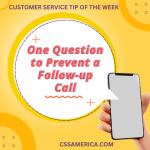I was facilitating a Service Excellence Training class for a Higher Ed client in the Northeast several years back. As I was walking through the portions of our technique for defusing the angry customer, I talked about empathy. I talked about accepting responsibility.
Immediately, one of the hands in the room went up. The employee said: I would never make statements like you’re suggesting. Once you start saying you’re sorry or once you start acknowledging their feelings, they’re going to sense that you’re weak. They’re gonna walk all over you.
I was a little bit taken aback initially, but not because somebody was challenging the technique. Primarily, I was surprised somebody would consider it a weakness to be empathetic. Somebody might consider it a weakness to accept responsibility.
I’ve always viewed empathy as a strength. It’s a higher level of awareness, a higher level of caring for another person. Being willing to look outside yourself to understand the unique needs and situations of another. It’s a strength to have emotional awareness of others. These are strong, positive attributes.
Now, I understand the employee’s point was that if you ‘put down your guard,’ if you acknowledge the other person, they may feel that they can berate you, or get you to do things on their behalf that are against policy, not ethical, or not the acceptable procedure. But what he was suggesting was to maintain a defensive posture. To not acknowledge the issue or any company responsibility.
What empathy does is to help the customer feel that you care, and to more quickly move you to a next step. What lack of empathy does is to create a stalemate, to bog down the conversation, to S-L-O-W progress toward a resolution, and to ramp up the negative emotions.
Use empathy to make the customer feel better, to feel heard and understood. But use it also because it saves you time, it keeps down emotions, and it moves the conversation along.
Use empathy as a strength. Make it your superpower.
Signup for FREE Tips! Contact Us More Resources for You Visit Our Home Page
























